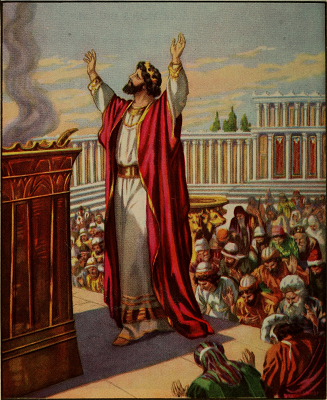July 5, 2001.
The final 9 chapters of Ezekiel are not the easiest to understand. What temple is Ezekiel talking about? Is he prophesying a future-literal-millennial temple, complete with Levitical priesthood and animal sacrifices? Or is his prophecy to be viewed as a symbolic representation of the present gospel and church?
The book of Hebrews has the best answer. Hebrews 9 goes into detail about the O.T. tabernacle, priesthood and sacrifices. In 9:9 and 10:1, it says all this was a figure and shadow of the New Covenant. Since the O.T. tabernacle/temple itself was a symbol of the salvation that is in Christ, we certainly have reason to consider Ezekiel’s temple prophecy as being similarly symbolic.
Not so, says the Scofield Commentary (called “Scofield Bible”). At Ezekiel 43:19 it says “Doubtless these offerings will be memorial, looking back to the cross, as the offerings under the old covenant were anticipatory, looking forward to the cross. In neither case have animal sacrifices power to put away sin.”
But there is a big problem with this literal view of Ezekiel’s temple and sacrifices. Fourteen verses, in 6 of the 9 chapters, including the verse where the note appears, speak of “sin offering,” with no hint of “memorial” or “figure.” Viewed literally, the sacrifices take away sin. Thus, a literal interpretation of Ezekiel 40-48 is a denial of the entire book of Hebrews and the entire gospel.
If someone wants memorials of the cross, we already have two. See Romans 6 and 1 Corinthians 11. Baptism and the Lord’s Supper are more than memorials; but they are memorials of the cross, nonetheless. According to Hebrews 10:4-10, Jesus came to the world the first time because God was not pleased with animal sacrifice. How could God be pleased with a rerun, now that Christ has offered the one sufficient sacrifice (Hebrews 9:24-28)?
